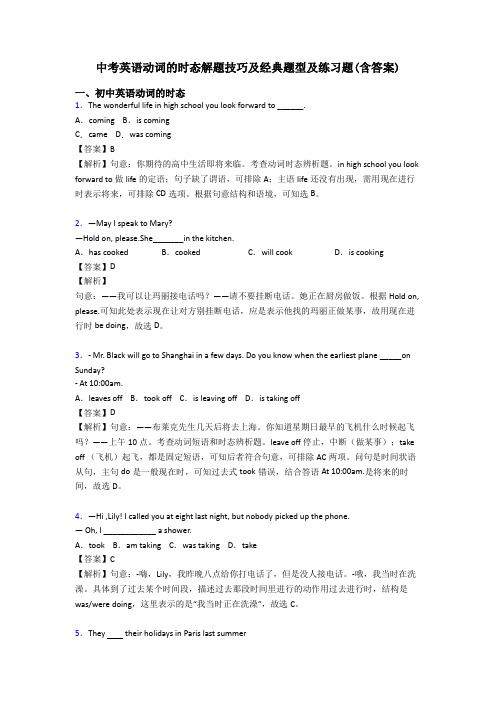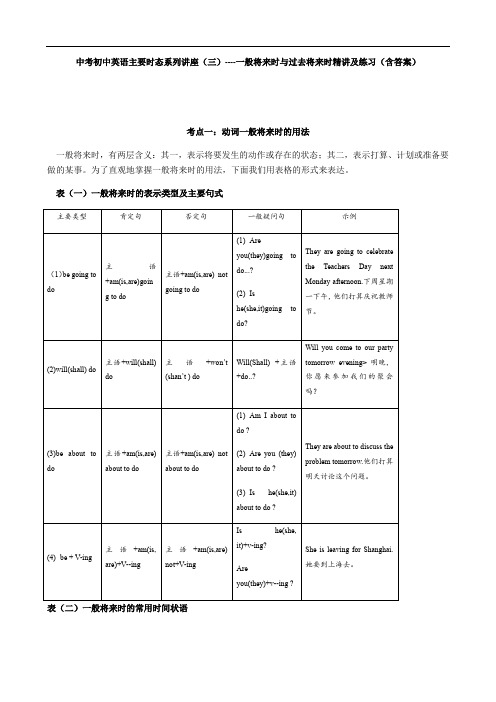初中英语时态讲解及练习(含答案)
【最新】初中英语一般将来时讲解与练习(含答案)

初中英语:一般将来时专项练习题1.If we do something the law, we will .A.against; punished B.with; be punishedC.with; punished D.against; be punished【答案】D【解析】【详解】句意:如果我们做了违法的事,我们将被惩罚。
against反对;with 和…...一起;结合句意,我们做了违反法律的事,应被惩罚,主语we与谓语publish之间是被动关系,故用被动语态,位于助动词will 后,故用动词原形,故选D。
2.It is reported that a space station ______ on the moon in a few years. A.was built B.will be builtC.is built D.has been built【答案】B【解析】【详解】试题分析:句意:据报道,几年后月球上将要建空间站。
表示几年后将要发生的动作,用一般将来时态,主语space station是谓语动词build的承受者,用被动语态。
故选B。
考点:考查动词的时态、语态辨析。
3.The Olympic Games ______ in Tokyo in 2021.A.hold B.will hold C.are held D.will be held 【答案】D【解析】【详解】句意:奥运会将于2021年在东京举行。
考查被动语态。
hold一般现在时;will hold一般将来时;are held一般现在时的被动语态;will be held 一般将来时的被动语态。
根据“in 2022(将来的时间)”可知此句时态是一般将来时,可排除AC选项。
主语“The 24 Winter Olympics”是动词held的受动者,需使用被动语态,可知使用被动语态,故选D。
4.A new mobile cabin hospital(方舱医院) ________ next time you come here.A.is completed B.was completed C.completedD.will be completed【答案】D【解析】【详解】句意:下次你来这的时候,一个新的可移动方舱医院将会完工。
初中英语时态练习题+附答案解析

初中英语时态练习题+附答案解析1.The boy is happy because he has sold out all the newspapers.2.The plan was given up because of the rain.3.We will not go climbing the hills if it XXX.4.Where have you been these days?5.Where is Tom。
He went to the post office。
He will be back soon.6.Mike says he wants to be a worker after he XXX.7.The last bus had just left when they got to the bus。
8.She won't go to bed until she finishes her work.9.XXX.10.I felt much better after I took the medicine.Note: There XXX.11."Where shall XXX?" "Let'XXX."12.I am afraid Mr Johnson will not visit our school tomorrow.13.I have lost my bike。
Have you seen it anywhere?14.Is this kind of car produced in Shanghai?15.We have seen several members of the family since we arrived.16XXX.17.The shop closes at this time of day.18.Where did you lose your watch?19.XXX last night?20.The nurse took good care of three children.21.Some children were taken good care of by the nurse.22.XXX.23.What language is XXX?24.The color TV was bought in that shop three days ago.25.He said he would stay here for another two days.26.The doctor said Jim must be operated on at once.27."Has the bridge been repaired yet?" "Yes。
[英语]初中英语一般将来时讲解与练习(含答案)
![[英语]初中英语一般将来时讲解与练习(含答案)](https://img.taocdn.com/s3/m/d08ad90e0640be1e650e52ea551810a6f524c8c9.png)
初中英语:一般将来时专项练习题1.Tourists ______because of their impolite behavior in our country from now on.A.will punish B.will be punished C.is punishing【答案】B【解析】【详解】解析:句意:从现在开始,游客们将因为他们不礼貌的行为而受到惩罚。
首先根据时间状语from now on可知句子表述的是将来的事情,判断句子中的谓语动词用一般将来时,主语tourists是动作punish的承受者,所以用被动语态,表示"被惩罚",一般将来时被动语态的构成是:主语+will be+动词的过去分词。
故答案选B。
2.He has ordered a watch on line for his father and it _______ to him before Father’s Day.A.send B.will be sent C.was sent D.sent【答案】B【解析】【详解】试题分析:句意:他在网上为父亲订了一块表。
将在父亲节前寄给他。
It指代的是“表”,作主语,与谓语动词send是逻辑上的动宾关系,it是其承受者,用被动语态;从时态上看,表将在父亲节前寄给他,用一般将来时态,故选B。
考点:考查动词时态及语态辨析。
3.I think AI (人工智能) in many fields will to help us solve many problems in the future.A.used, be used B.is used, be used C.used, useD.is used, use【答案】A【解析】【详解】句意:我认为在很多领域使用的人工智能将来将被用于帮助我们解决很多问题。
used被使用,过去分词形式;is used 一般现在时的被动语态;be used被动语态;use使用,动词原形。
中考英语动词的时态解题技巧及经典题型及练习题(含答案)

中考英语动词的时态解题技巧及经典题型及练习题(含答案)一、初中英语动词的时态1.The wonderful life in high school you look forward to ______.A.coming B.is comingC.came D.was coming【答案】B【解析】句意:你期待的高中生活即将来临。
考查动词时态辨析题。
in high school you look forward to做life的定语;句子缺了谓语,可排除A;主语life还没有出现,需用现在进行时表示将来,可排除CD选项。
根据句意结构和语境,可知选B。
2.—May I speak to Mary?—Hold on, please.She_______in the kitchen.A.has cooked B.cooked C.will cook D.is cooking【答案】D【解析】句意:——我可以让玛丽接电话吗?——请不要挂断电话。
她正在厨房做饭。
根据Hold on, please.可知此处表示现在让对方别挂断电话,应是表示他找的玛丽正做某事,故用现在进行时be doing,故选D。
3.- Mr. Black will go to Shanghai in a few days. Do you know when the earliest plane _____on Sunday?- At 10:00am.A.leaves off B.took off C.is leaving off D.is taking off【答案】D【解析】句意:——布莱克先生几天后将去上海。
你知道星期日最早的飞机什么时候起飞吗?——上午10点。
考查动词短语和时态辨析题。
leave off停止,中断(做某事);take off (飞机)起飞,都是固定短语,可知后者符合句意,可排除AC两项。
问句是时间状语从句,主句do是一般现在时,可知过去式took错误,结合答语At 10:00am.是将来的时间,故选D。
最新中考初中英语主要时态系列讲座(三)----一般将来时与过去将来时精讲及练习(含答案)

中考初中英语主要时态系列讲座(三)----一般将来时与过去将来时精讲及练习(含答案)考点一:动词一般将来时的用法一般将来时,有两层含义:其一,表示将要发生的动作或存在的状态;其二,表示打算、计划或准备要做的某事。
为了直观地掌握一般将来时的用法,下面我们用表格的形式来表达。
表(一)一般将来时的表示类型及主要句式表(二)一般将来时的常用时间状语表Array(三)一般将来时的主要用法【典型考例1】(2019天津)---What is your plan for next weekend,Lingling?----I volunteer work in the museum.A. was doingB. didC. have doneD. am going to do【析】正确答案D。
句意是:玲玲,下周末的安排是什么?我打算到博物馆去作志愿者。
根据上文的next weekend(下周末)可知,玲玲的回答是指下周的打算,所以用一般将来时,因此,正确答案为D。
【典型考例】(2019四川内江)---Have you watched the new movie,Joe?---No,I________ it with my sister this evening.A.watch B.are watching C.watched D.will watch【析】正确答案:D。
句意是:乔,你看了这部新电影吗?没有。
我今晚将和我妹妹一起去看。
根据本句末的时间状语this evening可知,看新电影这动作是将来要做的事情,因此动词使用一般将来时。
所以,正确答案为D。
【典型考例】(2019天津)----Could you tell me for the fruit?----By paying over the Internet.A. how much will I payB. how much I will payC. how will I payD. how I will pay【析】正确答案D。
初中英语动词时态(补完空版)_基础练习100题____答案及解析

初中英语动词时态(补完空版)_基础练习100题____答案及解析初中英语动词时态基础练习100题答案及解析热身:以go 为例,写出下列序号所代表的时态名称及谓语动词变化形式1一般过去时went2一般现在时go/ goes3 一般将来时will go4 过去进行时was/were going5 现在进行时is /am /are going6 过去完成时had gone7 现在完成时have/has gone答案1-15题答案BABDB CDDBA BBCCD这15道题均是一般现在时练习题一般现在时表示现在经常性的,习惯性的动作或状态用法如下:常见的时间状语,比如15题出现的(every day ),以及一系列every 形容的时间常见的频度副词,比如10题出现的(often ),以及seldom,sometimes,usually,always等常见的句型结构,如(1 )题(12 )题出现的主将从现句型结构(在时间状语和条件状语中,主句将来时,从句用一般现在时表将来的事)一般现在时涉及动词的不规则三单变化,例题有2.3等等不一一赘述一般现在时还涉及主谓一致的语法知识,如第13题遵从了就近一致的原则那我们回忆一下初中阶段适用就近一致原则的句型吧,共四个1 there be2 neither nor3 either or4 not only ….but also第14题也涉及到就近一致的语法知识,不定代词作主语,谓语动词用单数,什么是不定代词??不懂的同学别偷懒,查下语法书吧举几个不定代词的例子 1 everything 2 somewhere 3 nobody16-23题答案ABDCCBDD这些题目为一般现在时和现在进行时的比较一般现在时不说了说下现在进行时,它表示此时此刻正在进行的动作23题的(now )是最显著的现在进行时时间状语,它的同义短语是at the moment另外,17,22题的(look )这个词也提示我们注意正在发生的事,相似的词还有listen!除了此时此刻,这个时态的作用范围还可以广一点儿,表示近阶段正在做的事,比如19,20题,说的是这个学期,或是these days 的一个状况。
语法专练初中英语一般将来时讲解与练习(含答案)50题
初中英语:一般将来时专项练习题1.The 24th Winter Olympics in China in 2022.A.hold B.will hold C.are held D.will be held 【答案】D【解析】【详解】句意:第24届冬奥会将于2022年在中国举行。
考查被动语态。
in 2022是将来的时间,用于一般将来时,需借助will构成,可排除AC 选项。
主语The 24 Winter Olympics是动词held的受动者,需用被动语态,可排除B项。
根据句意结构,可知选D。
2.He has ordered a watch on line for his father and it _______ to him before Father’s Day.A.send B.will be sent C.was sent D.sent【答案】B【解析】【详解】试题分析:句意:他在网上为父亲订了一块表。
将在父亲节前寄给他。
It指代的是“表”,作主语,与谓语动词send是逻辑上的动宾关系,it是其承受者,用被动语态;从时态上看,表将在父亲节前寄给他,用一般将来时态,故选B。
考点:考查动词时态及语态辨析。
3.The School Art Festival_____ next month. You'd better prepare a talent show.A.holds B.is held C.will hold D.will be held 【答案】D【解析】【详解】句意:学校艺术节在下个月举办,你最好准备一个才艺展示。
考查一般将来时的被动语态。
holds一般现在时;is held一般现在时的被动语态;will hold一般将来时;will be held一般将来时的被动语态。
根据句中的时间状语“next month”可知,本句时态为一般将来时,再根据句意可知,主语“The School Art Festival”和谓语hold为逻辑上的动宾关系,应用被动语态。
优选 初中英语一般将来时讲解与练习(含答案)
初中英语:一般将来时专项练习题1.More schools in Laiwu ________ to provide children with better education in a few years.A.built B.are built C.were built D.will be built 【答案】D【解析】【详解】句意:,莱芜在几年内将建更多的学校,为儿童提供更好的教育。
分析句子结构可知,主语schools和谓语动词build之间在逻辑上是被动关系,句中的时间状语“in a few years在几年之后”是表示将来的时间状语,故用一般将来时的被动语态,结构为:will be+动词的过去分词built。
故选D。
2.—It’s said that the project we are looking forward to ______ out in our school this weekend.—Great! I can’t wait to take part in it!A.will be carried B.will carryC.being carried D.carrying【答案】A【解析】【详解】试题分析:句意:—据说我们期待的这个项目这个周末将在我们学校实行。
—好极了! 我迫不及待地要参加!根据句意可知是一般将来时态的被动句:will be +动词的过去分词。
所以选A。
考点:考查动词时态和语态。
3.According to the sports news, the Rugby World Cup _________ in France in 21.A.holds B.is held C.will hold D.will be held 【答案】D【解析】【详解】句意:据体育新闻报道,橄榄球世界杯将于2023年在法国举行。
考查一般将来时的被动语态。
A. holds第三人称单数;B. is held一般现在时的被动语态;C. will hold一般将来时;D. will be held一般将来时的被动语态。
(英语)初中英语重点一般将来时讲解与练习(含答案)
初中英语:一般将来时专项练习题1.What good news! Xiaogan West Station in Yunmeng in two years. A.buildsB.will buildC.is builtD.will be built【答案】D【解析】【详解】句意:多好的消息啊!孝感西站将于两年内在云梦建成。
A. builds 动词三单,建造;B. will build一般将来时态,将要建造;C. is built 一般现在时态的被动语态,被建造;D. will be built一般将来时态的被动语态,将被建造。
根据in two years表示将来的时间短语,以及主谓之间的被动关系,所以本句使用“一般将来时态的被动语态”。
故选D。
2. A Disneyland Park ________ in Shanghai Pudong New Area in the near future.A.has been built B.will built C.will be built【答案】C【解析】【详解】试题分析:句意:不久的将来,在上海浦东新区要建迪士尼乐园。
当主语是动作的承受者时,用被动语态。
结合句意,故选C考点:考查被动语态的用法。
3.—I’m wondering if I have passed the interview.— Please wait patiently. You at once if there is any news.A.will contact B.are contacting C.are contacted D.will be contacted【答案】D【解析】【详解】句意:——我想知道我是否通过了面试。
——请耐心等待。
如果有任何消息,我们会立即与您联系。
A. will contact一般将来时;B. are contacting现在进行时;C. are contacted一般现在时的被动语态D. will be contacted一般将来时的被动语态。
初中英语一般过去时讲解+练习(含答案)
1. 动词在语言中是必不可少的一部分。
它的语法现象也较多,但在初中范围主要有以下几方面问题。
① 时态:初中范围主要有一般现在时,一般过去时,一般将来时,现在进行时,过去进行时和现在完成时,六种时态。
② 语态:主动语态与被动语态。
③ 助动词和情态动词。
④ 非谓语动词,也就是不定式,动名词及现在分词的用法。
2. 人教版初中英语教学大纲中除了以上 6 种时态,还会涉及到过去将来时和过去完成时,考生要熟练掌握这些时态的构成形式及基本用法。
3. 动词时态一般出现在单项选择题和完形填空题中,前者一般 2 道题,后者一般 1 道题,共占 5 分左右;此外在写作部分,时态是一个重点考察的项目,时态如果把握好,能给作文大大提分。
动词各时态在每个年级的分布:第 5 讲 一般过去时1.yesterday 或与其构成的短语:yesterday morning(afternoon, evening)等;2.由 last+时间名词构成的短语:last night, last year (winter, month, week)等;3.由―时间段+ago 构成的短语:a moment ago, a short time ago, an hour ago 等;4.其它 just now ,过去的时间:in 2000 等;一般过去时在七年级下册 Unit 11 中第一次出现,在这个单元的学习中,学生需要掌握以下知识点:一般过去时的定义及特征一般过去时的两种结构及其变化一般过去时的规则动词变形和不规则变形一般过去时的定义及特征定义:表示过去某个时间里发生的非持续性动作或存在的状态,也表示过去经常或反复发生的动作。
She opened the door this morning. (过去的非持续性动作) They were expensive twenty years ago. (过去存在的状态) I went swimming every Saturday last year. (过去经常发生的事)特征: a.谓语动词用过去式She was a doctor.I watered the flowers in the back yard. b.有表示过去的时间词She saw some paintings yesterday . Mary went fishing last weekend .注意:常与过去时搭配使用的标志性时间词1. 否定: 主语+was/were + not +其它 I was not (wasn’t) here yesterday.My parents were not (weren’t) at home last 2. 一般疑问句: Was/ Were +主语+其他?肯定回答用―Yes, 主语+was/were. 否定回答用―No, 主语+wasn’t/weren’t. ―Were you at home yesterday? ―Yes, I was. (No, I wasn’t.)—Were Wei Hua and Han Mei here just3. 特殊疑问句:特殊疑问词 + was/ were + 主语+其他?【即学即练】1. He usually gets up early in the morning. But he late today.2. She usually works from 8 a.m. to 5 p.m. But she from 8 a.m. to 6 p.m. yesterday.3. They often go to the park on Sundays. But they to the park last Monday.4. He reads the newspaper at breakfast. But he the newspaper yesterday morning.一般过去时的两种结构及其变化结构一:表示过去的状态: 主语+was/were +其它如:She was here yesterday.Three years ago I was a pupil. My parents were at home last night. 变化形式:否定:主语+did not +实义动词原形+其它 He didn’t watch TV yesterdayMike did not go to the farm last Sunday.一般疑问句: Did+ 主语+实义动词原形+其它? Did he watch TV yesterday?Did Mike go to the farm last Sunday?3.特殊疑问句:特殊疑问词 + did+ 主语 +实义动词原形+其它?What did he do yesterday?Where did Mike go last Sunday?结构二:表示过去发生的动作: 主语+实义动词过去式+其它注意:实义动词过去式分为规则和不规则变化(知识点三、四将会做详细讲解)如:He watched TV yesterday.Mike went to the farm last Sunday. Tom came to China last month. 变化形式:【即学即练】 1. My father ill yesterday. ( 2017 长沙七年级期末) A. isn’t B. aren’t C. wasn’tD. weren’t 2. your parents at home last week? ( 2017 江西七年级月考)A. isB. wasC. areD. were3. The twins in Dalian last year. They here now. ( 2016 大连七年级期末) A. are; wereB. were; areC. was; areD. were; was4. I my homework at 7:00 yesterday evening. ( 2017 兰州七年级期末)A. finishedB. would finishC. was finishingD. finish5. —?— He did some reading at home. ( 2017 安徽中考) A. What does your father do yesterday evening? B. What does your brother do in the school? C. What did your brother do over the weekend? D. Where did your brother go last Sunday?一般过去时的规则动词规则变形及不规则变形规则变形:情况加法原形例词一般情况加-ed look looked 以e 收尾的词加-d use used末尾只有一个辅音字母的重读闭音节词先双写这个辅音字母,再加-edstopplanstoppedplanned以“辅音字母+y”结尾的动词先变y 为i,再加-ed worrystudyworriedstudied不规则变形:1.中间去e 末尾加t,如:keep →kept,feel →felt,sleep →slept,sweep →swept2.结尾d 变t,如:build →built,lend →lent,send →sent,spend →spent3.遇见i 改为a,如:ring →rang,sit →sat,drink →drank,sing →sang,swim→ swam,4.“骑(马)”“开(车)”“写(字)”把i 变o 如:ride →rode,drive →drove,write →wrote 5.“想”“买”“带来”“打仗”ought 换上,如:think →thought,buy →bought,bring →brought,fight →fought6.“教书”“抓住”——aught 切莫忘,如:teach →taught,carry →caught7.ow/aw 改为ew 是新时尚,如:know →knew,grow →grew,throw →threw,draw →drew 8.“放”“让”“读”过去式与原形一个样,如:put → put,let → let,read → read /red/【即学即练】Dear Jim,My school trip 1. (is) great! We 2. (have) so much fun! We 3.(go) to Green Park. We 4. (climb) the mountains there and 5.(see) a lot of flowers. We 6. (eat) lunch under some trees and 7.(play) some games after that. But at about two o’clock, it 8. (get) very cloudy and we 9. _ (worry) it would rain. Luckily, it 10. (do not),and the sun 11. (come) out again!Bill易错点一:难以判别是否用过去式,如:I went to the supermarket and bought (buy) some fruit.由于没有找到时间状语,因而不知道应该填什么。
- 1、下载文档前请自行甄别文档内容的完整性,平台不提供额外的编辑、内容补充、找答案等附加服务。
- 2、"仅部分预览"的文档,不可在线预览部分如存在完整性等问题,可反馈申请退款(可完整预览的文档不适用该条件!)。
- 3、如文档侵犯您的权益,请联系客服反馈,我们会尽快为您处理(人工客服工作时间:9:00-18:30)。
精选 时态 1. 一般现在时 形式:do does(单数第三人称) 意义:一般现在时表示客观的、普遍性的真理以及经常性的事件。 用法: A) 表示现在发生的动作、情况、状态和特征。 B) 经常性、习惯性动作。 e.g.:He always helps others. (他总是帮助别人。) He often goes to the gym. C) 客观事实和普遍真理。尤其要注意,如果前后文不是一般现在时,则无法保持 主句、从句时态一致。 e.g.: The sun rises in the east and sets in the west. Knowledge is power.
这一用法场合一些表动作频率的时间副词连用: 1). 表示肯定的频率副词:always, frequently, usually, sometimes, generally, occasionally, often etc. 2). 表示否定的频率副词:never, seldom, rarely etc. ➢ 这些副词的位置:在Be动词后,实义动词前。 e.g. He is always late.
2. 一般过去时 形式:did 意义:一般过去时表示在过去的某一特定时间发生和结束的活动或情况。 用法: A) 表示过去某个时间发生的动作或情况。 e.g.: I saw him in the library yesterday morning. (有特定的时间状语) ➢ yesterday, yesterday evening, last night/month/spring/year, the night before last(前天晚上),three days/months/years ago, in 1999 etc.。 这些时间状语之前不用加介词。 B) 表示过去习惯性动作,一直持续或反复发生的动作,此时可与表示拼读的时间副词连用。 精选
e.g.: I slept for eight hours last night. (表示在过去某一段时间内持续的动作,但这动作现在已经结束了)
3. 一般将来时 形式:will/shall do或be going to do 意义:一般将来时表示在未来的某个时间将要发生的某个动作或状态。 学明白一般将来时要理解的一下三个至关重要的概念: 1) 预测,表示说话人认为将来会发生某件事。 2) 事先计划:说话人在头脑里已经做出决定将来要做某件事。 3) 意愿:说话人既不是预计某事会发生,也不是预先经过考虑决定将做某事,而是在说话的时刻立即做出决断表明他将做某事。 用法: A) 用来预测,表示预测,或说估计将来要发生某事,可用 will 或be going to。 e.g.: According to the weather report, it will be windy tomorrow. B) 表示“打算去...,要...”时,可用be going to do。 e.g.: This is just what I am going to say. C) 表示“将要、正要”时,可用be about to do。 强调近期内或马上要做的事。 e.g. Do not worry, I am about to make a close examination on you. (别担心,我马上就给你做一次仔细的检查。) D) "be to do"的5种用法: a) 表示“按计划、安排即将发生某事或打算做某事”。 例:She is to be seen in the lab on Monday.(星期一你准会在实验室见到她。) b) 该做或不该做的事情(语气上接近于should, must, ought to, have to),表示一种命令、规劝性语气。 e.g.:You are to go to bed and keep quiet, kids. Our guests are arriving in less than 5 minutes.(孩子们,你们必须 上床睡觉,不准吵闹。我们的客人5分钟之内就要到了。) c) 能或不能发生的事情(接近can, may) 例:How am I to pay such a debt?(我怎么可能还得起这么大的一笔债呢?) d) 不可避免将要发生的事情,后来将要发生的事情。 精选
e.g.:I assure you that the matter _______ as quickly as possible. Have a little patience. A. will be attended B. will be attended to C. is attended D. is attended to will be attended to关键的一点是:attend表示“处理,解决”时是不及物动词,必须与to连用。另外,从上下文看,事情显然尚未解决,所以应该用将来时的被动语态。答案是B。 e) 用于条件从句“如果……想,设想”(接近if ……want to,或if ……should) e.g.:Greater efforts to increase agricultural production must be made if food shortage ____________ avoided. A is to be B can be C will be D has been 答案是A. is to be。全句的意思是:“如果要避免食品短缺,就必须作出更大努力来增加农业产量。”
➢ 表预测时,我们可以用will 或be going to。但两者还存在以下两点区别: 1) 用be going to 特别是意指根据目前的明显迹象来推断某件事将要发生。 will则只是表明说话人认为或相信某件事将要发生。 2) be going to 通常用来表示说话人与其所说的时间马上或在相当近的将来就要发生。而will所表示的动作发生的时间可近可远。 a. Look at those black clouds! It's going to rain. b. I feel terrible. I think I'm going to be sick. c. John is going to fall into that hole! d. Oh, my dear! They're going to bump against that tree! e. You look very pale. I am sure you are going to get sick. 精选
一般时态练习 一、用动词的适当形式填空 1.Vegetarians(素食者) (not, eat)meat. 2.An atheist(无神论者) (not, believe)in God. 3.Constant dripping(滴水) (wear)away a stone. 4.John (always, not, go)to school late. That is to say, he (sometimes, attend)school late. He (be, generally)a good student. He (be, always)ready to help others. 5.If it (rain)tomorrow, we'll have to put off our sports meet. 6.Look!Here (come)your boyfriend! 7.Mozart (write)more than 600 pieces of music. 8.I (be)very tired last night, so I (go)to bed early. 9. you (go)anywhere on Labor Day? 10.When I was young, I (want)to be a bus driver.
答案: 1.don't eat 2.doesn't believe 3.wears 4.doesn't always go, sometimes attends, is generally, is always 5.rains 6.comes 7.wrote 8.was,went 9.Did,go 10.wanted 精选
4. 现在进行时 形式:be doing: am/is/are +doing.(是助动词,没有“是”的意思). 意义:强调在现在这个时间点,某项活动正在发生。 用法: A) 表示说话此刻正在进行。 e.g.: What program are you watching? I am studying English. B) 表示现阶段正在持续的动作。这是进行时态表示的是一个一般性的活动,在说话时刻这个动作并不一定正在发生。 e.g.: These days I am translating a book. C) 表示最近的将来一定的安排。通常含有“计划”、“安排做”之意。 e.g.: I am taking a makeup test tomorrow. D) 现在进行时常与always, forever, continually, constantly等连用,往往表示抱怨、厌烦、不合理或使人不愉快的事。 e.g.: Jack is always borrowing money and forgetting to pay you back. Jack常常借钱忘还。 How come Joe is always groaning about things? Joe为什么总是在抱怨?
5. 过去进行时 形式:be doing: was/were doing 意义:强调在过去这个时间点,某项活动正在发生。 用法: A) 用来描述一个过去特定的时刻正在发生的事情。 e.g.: I was discussing my thesis with my director at this time last night.(特定时刻) B) 过去进行时还常常和一般过去时配合使用。 此时,过去进行时通常表示一个历史较长的体现“背景”的动作或状态;而一般过去时则表示此“背景”下发生的,短暂的动作或状态。过去进行时动作先发生,一般过去时动作后发生。 e.g. I was telephoning Harry when she arrived.(在五打电话过程中,她到了。先telephone,后arrive) I telephoned Harry when she arrived.(她回来之后,我才打电话。先arrive,后telephone)
